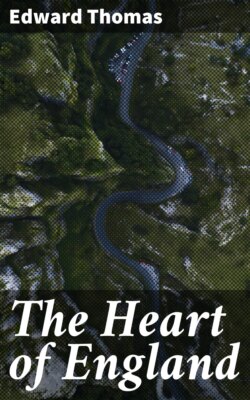Читать книгу The Heart of England - Edward Thomas - Страница 9
На сайте Литреса книга снята с продажи.
CHAPTER IV
WALKING WITH GOOD COMPANY
ОглавлениеTable of Contents
The lightning grows upon the sky like a tumultuous thorn tree of fire. The thunder grumbles with interrupted cadences, and then, joyful as a poet, hits the long, grave, reverberating period at last, repeats it triumphantly, and muttering dies away. The pheasants in the woods have got over their alarm and have ceased to crow, and for a time the heavy perpendicular rain submerges the meadow and farmhouse and mid-field oak and the steep downs with their cloudy woods; the birds are still.
Then the rain wastes away. I can count the drops on the broad burdock leaves; and the evening sun comes through horizontally; and it is good to be afoot and making for something remote, I know not why. Each meadow shines amid its encircling hedges like a lake of infinitely deep emerald. On the dark red ploughland the flints glitter with constellated or solitary lights. In the sweet copses, where the willow wren sings again in the highest branches, the thorn foliage is so bright that the dark stems are invisible. The purple oak tops reach wonderfully into the sombre, bluish sky, and over them the wood pigeons turn rapidly from darkness to splendour—from splendour to darkness, as they wheel and clap their wings. The cuckoos shout again; first one, so far off that the character, without the notes, of the song is recognised; then another with a wild clearness in its voice as if the rainy air aided it; and then one just overhead, in the luminous grey branches of an oak, so that it can be heard trying hard and enjoying its own strength. The hills rejoice with long shadows and yellow light; the tall hares stretch themselves and gallop. The little pools hum pleasantly as the rain drips from their overhanging brier and bramble into the leaden water with bright splash. And in our own muscles and hearts the evening strives to form an aspiration that shall suit the joy of the hills, the meadows, the copses and their people. We will go on, they say; we will go on and on, through the beeches on the hill and up over the ridge and down again through the grey wet meadows and to the old road between hawthorn and guelder-rose at the foot of the downs; and still on, not as before, but out of time and space, until we come—home—to some refuge of beauty and serenity in the heart of the immense evening. And so we will, though we shall be wise to find our achievement in the rapture of walking, or in the short rest upon a gate where we may surprise the twilight at her consecrating task. It is well, too, to talk, not to walk silently and weave such dreams as will make our host to-night intolerable; or if not to talk, then to sing some old song whose melody finds a strange fitness to our minds, in spite of the words, as for example—
“There’s not a drunkard lives in our town
Who is not glad that malt is gone down—
Malt is gone down, malt is gone down,
From an old angel to a French crown.” …
Or,
“The fox jumped over the hedge so high.” …
Or,
“Orientis partibus adventavit asinus.” …
(Sung to the tune of the Welsh New Year’s Eve Song.)
Or,
“There was a farmer’s son kept sheep upon the hill,
And he went forth one May morning to see what he could kill,
Sing blow away the morning dew, the dew, and the dew,
Blow away the morning dew; how sweet the winds do blow.” …
Or,
“Quand le marin revient de guerre—
Tout doux—
Quand le marin revient de guerre—
Tout doux—
‘Tout mal chaussé, tout mal vêtu,
Pauvre marin! d’où reviens-tu?—
Tout doux.’ ”
Then perhaps we will lazily inquire why songs about the price of malt, or the coming of a Beautiful Ass out of the East should stir and uplift and compose the hearts of men dreaming of an ideal beauty on an April evening, and so to more songs and then to bed, finding at the last moment the serene and beautiful, perhaps, in the glimpse of holy evening landscape rich in unseen nightingales as we fall asleep.
